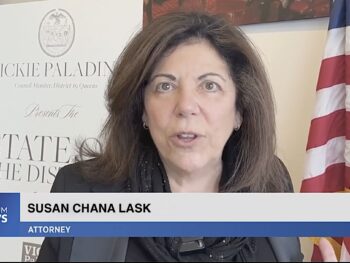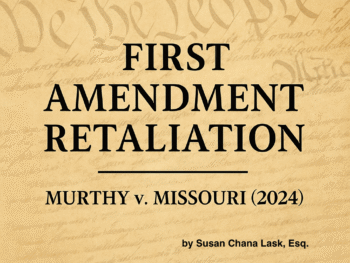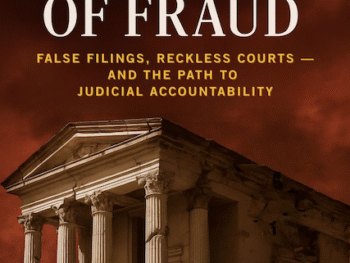THIS BRIEF WAS ENTIRELY RESEARCHED & DRAFTED BY
SUSAN CHANA LASK, PRO HAC VICE, FOR THE CASE
SUPERIOR COURT OF NEW JERSEY APPELLATE
DIVISION DOCKET NUMBER: A-2768-07
ON APPEAL FROM SUPERIOR COURT OF NEW JERSEY
SPECIAL CIVIL FAMILY PART GLOUCESTER COUNTY: CIVIL ACTION
SHARON A.F. MIKEN, Respondent,
vs.
JANE F. HIND, Appellant.
J
BRIEF IN REPLY & RESPONSE FOR APPELLANT JANE F. HIND
TABLE OF CONTENTS
Page No.
I. INTRODUCTION……………………………… 1
II. ARGUMENT……………………………………… 2
|
||||||||||||||||||||||||||||||||||||||||||
Borodinsky v. Borodinsky,162 N.J.Super. 437, 443-44 (App.Div.1978)………. 11
Cesare v. Cesare,154 N.J. 394, at 413 (1998).……………………. 11,13,14 Gerhardt v. Continental Ins. Cos.,48 N.J. 291, 225 A.2d 328 (1966)……………….. 12
Lewis v. Harris,188 N.J. 415 (2007)………………………………thoughout Morsemere Fed. Sav. & Loan Assn v. Nicolaou, 206 N.J. Super. 637(App.Div.1986).…………… 11
New Hampshire v. Maine,532 U.S. 742 (2001…………………………..
4
North Bergen Rex Transp., Inc. v. Trailer Leasing Co.,158 N.J. 561, 569, 730 A.2d 843 (1999)…………
12
Packard-Bamberger & Co., Inc. v. Collier,167 N.J.427, 444 (2001)…………………….. 13
i
Rendine v. Pantzer,141 N.J. 292, 317 (1995)……………………… 13 Sears, Roebuck & Co. v. Camp, 124 N.J.Eq. 403, 411-412, 1 A.2d 425 (E & A 1938).. 11 Zedner v. United States,547 U.S. _____, 126 S. Ct. 1976(2006)………….
4
Statutes, Rules, Bills, Treatises
Domestic Partnership Act N.J.S.A. 26:8A-1, et seq…….. throughout Civil Union Act……………………………………
throughout Pressler, Current N.J. Court Rules,
comment 1 on R. 4:42-9 (2003) …………………. 12
ii
I. INTRODUCTION
Miken’s first sentence in her responsive Brief claims this case is “novel”. This case is not novel. It is a basic termination of a domestic partnership pursuant to statute, wherein the Family Court appropriately applied principles of equity. In fact, the trial court applied the very principles of equity Miken requested, to wit:
“It is in your discretion. Whether or not you want to
effect equitable distribution, principles of equity, it’s
in your hands. You’re not told that you cannot effect
equitable distribution. It is a right that’s provided to
you in your judicial discretion.” (1-15-08 183:1-5)
Thus, it is unimaginable how Miken appeals from the very relief she requested.
The only thing novel here is that Miken and her counsel humiliated Ms. Hind and insulted the judiciary, the Bar and the public by publishing a false press release stating they won a “novel” decision by Judge Tomasello deciding a domestic partnership was a “marriage” where he applied “equitable distribution” (33-35a). That never happened. More insulting, it was Miken who drafted the false judgment by adding the words “equitable distribution”, knowing that was never granted and to bolster her counsel’s false press release (12a-13a,14a-17a, 43a-44a). Miken’s counsel touted in this case that he is an “expert”1 in gay issues because his agenda was to use this simple 1 An unethical claim as no expertise in gay issues exists by New
Jersey Supreme Court standards, as related in Hind’s Brief.
termination of a domestic partnership to make a name for himself as the gay rights “expert”. When Judge Tomasello discovered Miken and her counsel’s false press release and filings, he immediately issued an April 24, 2008 corrected judgment removing the words “equitable distribution” that Miken’s counsel slipped in (41a-44a,23-44a). Those facts being clear, it is more insulting for Miken to continue the fabrication by stating in her factual statement at page 2 that “equitable distribution” was granted, and so forth throughout her response Brief. It is noted most of Miken’s argument is not supported by the record as many statements are those of her counsel that were never said at the trial court.
II. ARGUMENT
Hind relies on the cases and arguments in her June 16, 2008 Brief as responsive to Miken’s response Brief, in addition to the following.
A. MIKEN ADMITTED IRRECONCILABLE DIFFERENCES DID NOT EXIST TO PURSUE THIS ACTION. HER ARGUMENT THAT EVERY SAME SEX COUPLE MUST BE TREATED AS A MARRIED COUPLE IS IRRESPONSIBLE AND CONTRARY TO LEWIS.
Miken misrepresents that Hind’s trial counsel consented to irreconcilable differences. The record is clear that Hind’s counsel objected to irreconcilable differences as a mode to terminate under the statute and Miken’s counsel agreed “It’s not”:
“T THE COURT: You — if you want to amend to irreconcilable differences, that’s fine.
M MR. RUSSELL: I don’ think that’s available in these domestic partnerships. THE COURT: Yes.
MS. KERNECHEL: It’s not -MR. RUSSELL: Mr. Hyland pointed that out.(2T6:9-15)
Even Miken questioned her counsel as to how she could at trial claim it was an “irreconcilable differences” case when Miken’s position throughout the case was that irreconcilable differences could never be a cause of action (10a-11a):
Q And do you agree — do you consent to withdraw your claimof extreme cruelty against the defendant?
A As long as it’s clear that irreconcilable differences are– are -
Q Okay.
A — I’m a little unclear as to how this is just a
Q Well, it appears that we can join with the defendant inasking for irreconcilable differences, although thestatute doesn’t allow it, Lewis verses Harris would guide.
MS. KERNECHEL: Is that correct, Your Honor? THE COURT: That’s correct. MS. KERNECHEL: Thank you. MS. MIKEN: Thank you.(2T8-9:13-3)
Most disturbing is that when Miken on the record questioned how her counsel could change positions at trial, her counsel misled her by engaging the trial court in counsel’s misrepresentations of the law. The trial court’s error to believe that Lewis permitted irreconcilable differences was based upon Miken’s counsel’s misrepresentations that case law determined the cause of action.
Estoppel exists when three elements coalesce: (1)materially false or inconsistent statements; (2)upon which individuals rely to their detriment; (3)in a manner that causes material prejudice to hearers or results in unfair advantage to the speaker. New Hampshire v. Maine, 532 U.S. 742 (2001; Zedner v. United States, 547 U.S. _____, 126 S. Ct. 1976 (2006). All three elements are present here. Miken objected to irreconcilable differences for 7 months of the case, and suddenly at trial she interposed a materially false and inconsistent statement that Lewis permits it. The trial court and all present relied upon Miken’s counsel’s misrepresentations. The detriment to Hind is that the case could have been dismissed as Miken was unable to proceed with a cruelty cause of action, and there would never have been an action before the trial court to proceed to judgment.
It was a materially false claim by Miken’s counsel at trial that Lewis permits irreconcilable differences. Clearly causes of action for termination of a domestic partnership are legislatively created, not a creature of common law. Lewis v. Harris did not create a new cause of action. Lewis held that committed same-sex couples shall be afforded a “statutory scheme” that provides them the same rights and benefits enjoyed by opposite-sex couples under the civil marriage statutes. In response, our Legislature created Civil Unions and amended a series of laws within the State, including the equitable distribution statute, to provide that committed same-sex couples who choose to enterinto a Civil Union obtained marriage rights and benefits. Those same sex couples not in a civil union are not considered married couples.
The theory of Lewis that Miken asserts would confer on all individuals in a Domestic Partnership certain rights and responsibilities that they did not bargain for when entering into that contract. Moreover, Miken’s entire position at pages 16-18 of her response brief wants this court to believe that every same-sex couple should be treated as a married couple. That is an irresponsible argument. Should we treat every heterosexual couple as a married couple just because they are living together? We do not apply equitable distribution to unmarried couples who have property disputes. There are many same sex couples that do not intend to be considered married. There are many same-sex couples who maintained their domestic partnership status just as Hind and Miken did to retain limited rights without the additional burdens of marriage type rights that a same sex Civil Union affords. In fact, Hind testified she entered into the domestic partnership solely for the health benefits it provided, never intending to marry Miken (2T69:3-13)
Miken’s claim that the Civil Union did not exist when they filed a domestic partnership fails as well. Hind and Miken could have gone to other States and even Canada to marry if they wanted to be considered a married couple. But they did not do that. Miken and Hind by law never could be considered a married couple as they were simply in a domestic partnership.
It is a misrepresentation to state Hind conceded to extreme cruelty so irreconcilable differences should be allowed. Extreme cruelty needs to be proven to the Court’s satisfaction even during an inquest at trial. Certainly the Court felt uncomfortable with the cruelty cause of action pled as it lowered the standard by erroneously implementing irreconcilable differences. If Miken were held to her burden of extreme cruelty, the trial court may have dismissed the pleading.
B. HIND WAS READY, WILLING AND ABLE TO PERFORM THECONTRACT BUT FOR MIKEN BREACHING THE CONTRACT
Consideration can be a promise to do or not do something, or forgo something one has a legal right to do. There need not be a “tender of payment” as Miken argues. Nevertheless, in this case, Hind agreed to pay Miken or tender payment. The fact that it had not yet been tendered does not negate the formation of a contract nor the terms. Hind was ready, willing and able to proceed but for Miken breaching the contract.
To clear the record, Miken misdirects this Court that the e-mails were not included in the record. Miken knows the actual e-mails were not provided with the transcripts because the trial stenographer did not keep them so she could not file them with the transcripts. Thus, the record speaks for itself as each e-mail was testified to therein.
Finally, Miken adds Hind’s will as an exhibit to her Brief to bolster her argument that a Will proves she had a contract with Hind to get more money. The Hind Will merely showed that Hind intended to leave property to Miken should Hind die. A will is not a contract as Miken inappropriately argues. It is a testamentary instrument changeable at will, which it was appropriately terminated by Hind.
Finally, we must note Miken claims she does not want a windfall, but that is exactly what she received by the trial court’s erroneous judgment. It is well noted in the record that Hind contributed a lot of money and sweat equity into Miken’s many properties over the years, including taking care of Miken’s grandmother and losing her pension to move with Miken(1T30:5-20; 31:22-24;43:8-13;44-45:11-24;2T32:1-15,33-34:25-3), yet Hind’s ten years of contributions were never even factored into the equation of principles of equity by the trial court. Thus being another error in judgment predicated on erroneous rulings by the trial court;including permitting the case to proceed to judgment when Miken refused to prove a statutory cause of action.
C. HIND FILED AN OCTOBER 14, 2008 MOTION TO DISMISSMIKEN’S CROSS-APPEAL BECAUSE MIKEN NEVER FILED A NOTICE OF APPEAL ON THE FINAL APRIL 24, 2008 JUDGMENT.THE FINAL JUDGMENT VITIATED MIKEN’S FALSE EQUITABLEDISTRIBUTION ARGUMENT.
The following arguments are made pending Hind’s motion to dismiss Miken’s improper cross-appeal due to Miken’s failure to file a Notice of Appeal on the April 24, 2008 Judgment.
D. PURSUANT TO THE LAW AND MIKEN’S OWN REQUEST, THETRIAL COURT APPROPRIATELY APPLIED PRINCIPLES OF EQUITY
Miken specifically requested principles of equity as an alternative to equitable distribution based on her understanding that the Act did not mandate equitable distribution, to wit:
“there are definite issues of — of equity that would– that would allow a Family Court, that has thatdiscretion, to move forward.”(2T23:1-3).
What we are looking for is equitable distributions –equitable distribution on the assets, or in thealternative, we’re looking for principles of equity to beapplied.”(2T195:7-10)
The trial court gave exactly what Miken requested, specifying that it could use its discretion to apply principles of equity because Miken and Hind were not in a civil union(2T24-25:15-2):
“I’m going to apply equitable principles to get a fair
result…”2T25:23-24)and “I clearly have the authority and the discretion to divideproperty, as I think it should be fairly done underequitable principles.”(2T26:2-4)
Despite obtaining the relief requested by Miken and consistent with her shifting of positions, she now comes before this Court demanding equitable distribution. Her disingenuous position is belied by her disingenuous Notice of Appeal stating the trial court did not apply equitable distribution factors appropriately. The fact is that equitable distribution was never considered in the trial court’s decision; again, consistent with Miken’s request at trial to apply either equitable distribution or principles of equity. Miken further misrepresents the trial court’s decision as using equitable distribution factors at her Brief, page 39 paragraph 1. The trial court never relied on the equitable distribution statute, and in fact took pains not to. Her listing equitable distribution factors in her appellate Brief as new argument is inappropriate and must be stricken. It is also inappropriate for Miken to lump in an argument about inheritance that was never a stated issue in a Notice of Appeal by Miken, no less Miken’s Notice of Appeal was never amended or refiled to reflect the corrected April 24, 2008 judgment.
Miken continues here again with her flawed presentation of Lewis that a “permanent committed same sex relationship” has the same rights, benefits and obligations as a marriage. Miken wants Lewis to ultimately confer certain rights, benefits and obligations on same-sex couples that do not exist for opposite sex couples that do not marry. Lewis just does not do what Miken wants us to think it does. Miken’s interpretation would create a flood gate of litigation for individuals trying to prove that they are in a “permanent committed relationship”. The way that is proven for opposite-sex couples is by “marriage”, as such the same type structure must apply to same-sex couples–civil unions.
What Miken refuses to inform this Court is that Lewis stands for directing the Legislature to create the law for same sex couples to file similar to a marriage. The result was the Legislature establishing the civil union act.
There are thousands of same sex couples in a relationship, but not every same sex relationship is worthy of the benefits of a marriage. They may be dating. They may be living together. They may have moved in together after dating a few weeks. It is not the fact that they are a same sex couple that dictates they are “married” and have rights under our laws as married couples as Miken argues. They must acknowledge their commitment by filing either a domestic partnership or a civil union to obtain the respective rights either statute provides. The same as a heterosexual couple must file for a marriage to obtain the benefits of our laws.
As explained in Hind’s Brief, the Domestic Partnership Act was not meant to be a marriage, and the 2007 Civil Union Act stated so; to wit:
“This Act shall not alter the rights and responsibilitiesof domestic partnerships existing before the effectivedate of this Act, except that eligible domestic partnersshall be given notice and opportunity to enter into a civilunion.” NJSA 26:8(a)-4.1
The Civil Union is the only marriage statute for same sex couples, not domestic partnerships. Moreover, the trial court recognized that equitable distribution is a creature of statute dependent on the existence of a marriage or civil union NJSA 2A:34-23.1(a), not a domestic partnership. After hearing extensive argument from both parties on the issue(2T10-23:16-3), the trial court appropriately invoked its discretion to apply the principles of equity that Miken requested. It did so after giving its well reasoned facts and opinion of law (2T23-26:5-5)
“A court of equity has considerable discretion, applying equitable principles, to condition the relief it gives a litigant. Morsemere Fed. Sav. & Loan Assn v. Nicolaou, 206 N.J. Super. 637(App.Div.1986). A trial court’s discretionary determination will not be disturbed regarding the amount and manner of division of property if there was no mistaken exercise of discretion . Borodinsky v. Borodinsky, 162 N.J.Super. 437,
443-44 (App.Div.1978). Historically, the broad intent of equity’s power to remedy a wrong and create new and innovative ways to resolve disputes fairly was described in Sears, Roebuck & Co. v. Camp 124 N.J.Eq. 403, 411-412, 1 A.2d 425 (E & A 1938):
“Equitable remedies ‘are distinguished for theirflexibility, their unlimited variety, their adaptabilityto circumstances, and the natural rules which govern theiruse. There is, in fact, no limit to their variety andapplication; the court of equity has the power of devisingits remedy and shaping it so as to fit the changingcircumstances of every case and the complex relations of all the parties.” A lack of precedent, or mere novelty inincident, is no obstacle to the award of equitable relief,if the case presented is referable to an established headof equity jurisprudence-either of primary right or ofremedy merely.”
Moreover, “[b]ecause of the family courts’ special jurisdiction and expertise in family matters, appellate courts should accord deference to family court fact-finding.” Cesare v. Cesare, 154 N.J. 394, at 413 (1998). Thus, the trial court appropriately applied its discretion and its holding to apply equitable principles must not be disturbed.
E. THE DOMESTIC PARTNERSHIP STATUTE DOES NOT PROVIDE FOR COUNSEL FEES. THE TRIAL COURT APPROPRIATELY DENIED COUNSEL FEES IN ITS DISCRETION.
Miken has no right to demand attorney fees. The Act does not permit attorney fees in the first place as it was meant to be a simplified procedure, not a protracted litigation. Thus, Miken is limited to New Jersey’s strong policy disfavoring shifting of attorneys’ fees. North Bergen Rex Transp., Inc. v. Trailer Leasing Co., 158 N.J. 561, 569, 730 A.2d 843 (1999). That public policy is premised upon a determination that “sound judicial administration will best be advanced by having each litigant bear his own counsel fee except inthose few situations specifically designated” in the rule. Pressler, Current N.J. Court Rules, comment 1 on R. 4:42-9 (2003) (quoting Gerhardt v. Continental Ins. Cos., 48 N.J. 291, 225 A.2d 328 (1966)).
As counsel fees were not mandated by statute, Miken advanced a faulty argument that attorney fees were warranted because she claimed Hind acted in “bad faith” during negotiations:
“you’ll get in my close regarding the issues of — ofbad faith and — and more negotiations here. But if therewere ever a case for attorney’s fees, at this point, youknow, I think that — that they’re here.”(2T21:17-22) and
“We feel that there was a bad faith position takenregarding negotiating and working together.”(2T204:19-20)
It is unsophisticated in litigation to claim attorney fees are warranted because another party did not negotiate and work together. It is a fact of litigation that opposing counsel does not have to agree to Miken’s counsel’s terms.
The fact is that during the litigation Miken’s counsel took the bad faith position that they can do whatever they want, and if the case did not go their way, they created facts and filed false documents to get what they wanted. When they lost their “equitable distribution” position they embarrassed the judiciary and Bar by filing a false press release claiming they won a decision that never happened. They filed a false judgment that the trial court had to waste judicial resources to correct. Hind’s opposition to Miken and her counsel’s misconduct benefited the legal system. She should be rewarded for opposing Miken and her counsel’s misconduct, and Miken and her counsel should be rebuked by this Court.
For the sake of clarity, even if there was a statutory mandate for counsel fees, which there is not in the Act, then the law is clear that the trial court appropriately used its discretion to deny them. It is well-settled that the decision to award attorney’s fees rests within the discretion of the trial judge, and accordingly the decision is reviewed under the abuse of discretion standard. Packard-Bamberger & Co., Inc. v. Collier, 167 N.J.427, 444 (2001). The scope of appellate review of the trial court’s factual findings is limited. “The general rule is that findings by the trial court are binding on appeal when supported by adequate, substantial, credible evidence.” Cesare v. Cesare, 154 N.J. 394, at 411-12 (1998). “[F]ee determinations by trial courts will be disturbed only on the rarest occasions, and then only because of a clear abuse of discretion.” Rendine v. Pantzer, 141 N.J. 292, 317 (1995). Here, argument was heard from both parties (2T18-19:7-18;21:17-22; 174-175:17-14;182:5-9; 204-209:12-17). Miken’s counsel made extensive argument, detailing facts as she saw it for the trial court (2T204209:12-17). She even filed a trial memo arguing for counsel fees(2T203:2-3). The trial court carefully reviewed and analyzed the extensive arguments for attorney fees (2T210- 226:1-8), including Miken’s trial memo (2T203:2-3). The trial court gave its rationale (2T224-226:19-) and found there was no bad faith as there were “issues that needed to be litigated” (2T225:16-17) and “…on that basis,I think the only fair way, again,to resolve the matter is to deny counsel fees on both parties” (2T226:1-3).
It is established that “[b]ecause of the family courts’ special jurisdiction and expertise in family matters, appellate courts should accord deference to family court fact-finding.” Cesare at 413. It should be concluded that the trial court carefully reasoned its denial and there was no mistaken exercise of discretion in the result reached. Respectfully, this court has no occasion to interfere with the judgment.
III. CONCLUSION
For the forgoing reasons, Hind respectfully requests this court reverse the trial court’s termination based upon non-statutory grounds, dismiss the complaint, vacate the judgment and impose costs and fees against Miken to Hind with respect to her making a cross-appeal when she never filed the appropriate Notice of Appeal,making argument never noticed in her improper Notice of Appeal and arguing frivolously for attorney fees and equitable
distribution when she admits it is discretionary.
Dated: October 13, 2008 Respectfully,
SUPERIOR COURT OF NEW JERSEY APPELLATE DIVISION DOCKET NUMBER: A-2768-07
JANE F. HIND, : CIVIL ACTION APPELLANT, : ON APPEAL FROM SUPERIOR vs. : COURT OF NEW JERSEY SHARON A.F. MIKEN, : SPECIAL CIVIL FAMILY PART RESPONDENT. :
PROOF OF SERVICE
I, Susan Lask, hereby certify as follows:
1. I am not a party to this action.
2. On October 14, 2008 I caused to be mailed via Federal Express service to the Appellate Division five copies of Appellant’s Reply Brief and served two copies to Respondent’s counsel at the following addresses with proper postage:
Honorable Judges of the Superior Court of New Jersey Appellate Division Richard J. Hughes Justice Complex CN 006 Trenton, New Jersey 08625
Robert J. XXXXXXXXXX, Esq. 4 Kings Highway East Haddonfield, NJ 08033
3. I hereby certify that the foregoing statements made by me are true. I am aware that if any of the foregoing are willfully false then I am subject to punishment.
Susan Chana Lask 10/14/08









